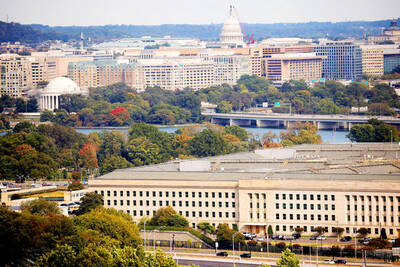The teenage survivors of a crocodile attack in outback Australia told yesterday how they clung to a tree for almost a day while the giant reptile that killed their friend circled beneath them.
Nineteen-year-olds Shaun Blowers and Ashley McGough were riding their quad bikes with Brett Mann on Sunday when they decided to clean themselves off on the banks of the Finnis River, 40km south of the Northern Territory capital Darwin.
Blowers said Mann, 22, slipped into deep water and his companions were trying to help him back to shore when the 4m saltwater crocodile attacked.
"I went past the croc, I didn't see it, Ashley screamed out `croc, croc,' we just swam to the nearest tree and straight up we went," he told reporters.
"We were looking around for Brett [but] didn't hear a thing, didn't hear a scream, no splashing or anything. Two minutes later the croc brought Brett to the surface and pretty much showed him off to us and off he swam."
With the pair still stuck up the tree growing mid-stream in the river, the crocodile returned.
"Five minutes later he was back stalking the tree around us, he just hung around us all night and pretty much all the next morning," Blowers said.
He said they remained perched in the tree for 22 hours, checking on each other through the night to ensure neither had fallen asleep.
Eventually the noise of a police rescue helicopter scared off the crocodile.
The pair were airlifted from the tree and taken to Royal Darwin Hospital and treated for shock and hypothermia.
Blowers said they had not yet come to terms with their ordeal.
Police spokeswoman Erica Sims said police and wildlife officers were searching for the crocodile and Mann's body.
Mann is the eleventh person since 1982 killed by the saltwater crocodiles that infest northern Australian rivers and estuaries.
The most recent victim was a 24-year-old German tourist taking a break in a Northern Territory national park in October last year after surviving the Bali terrorist bombing.

FIREPOWER: On top of the torpedoes, the military would procure Kestrel II anti-tank weapons systems to replace aging license-produced M72 LAW launchers Taiwan is to receive US-made Mark 48 torpedoes and training simulators over the next three years, following delays that hampered the navy’s operational readiness, the Ministry of National Defense’s latest budget proposal showed. The navy next year would acquire four training simulator systems for the torpedoes and take receipt of 14 torpedoes in 2027 and 10 torpedoes in 2028, the ministry said in its budget for the next fiscal year. The torpedoes would almost certainly be utilized in the navy’s two upgraded Chien Lung-class submarines and the indigenously developed Hai Kun, should the attack sub successfully reach operational status. US President Donald Trump

Taiwan Semiconductor Manufacturing Co (TSMC, 台積電) is expected to start construction of its 1.4-nanometer chip manufacturing facilities at the Central Taiwan Science Park (CTSP, 中部科學園區) as early as October, the Chinese-language Liberty Times (the Taipei Times’ sister newspaper) reported yesterday, citing the park administration. TSMC acquired land for the second phase of the park’s expansion in Taichung in June. Large cement, construction and facility engineering companies in central Taiwan have reportedly been receiving bids for TSMC-related projects, the report said. Supply-chain firms estimated that the business opportunities for engineering, equipment and materials supply, and back-end packaging and testing could reach as high as

ALL QUIET: The Philippine foreign secretary told senators she would not respond to questions about whether Lin Chia-lung was in the country The Ministry of Foreign Affairs on Wednesday confirmed that a business delegation is visiting the Philippines, but declined to say whether Minister of Foreign Affairs Lin Chia-lung (林佳龍) is part of the group, as Philippine lawmakers raised questions over Lin’s reported visit. The group is being led by Deputy Minister of Agriculture Huang Chao-chin (黃昭欽), Chinese International Economic Cooperation Association (CIECA) chairman Joseph Lyu (呂桔誠) and US-Taiwan Business Council (USTBC) vice president Lotta Danielsson, the ministry said in a statement. However, sources speaking on condition of anonymity said that Lin is leading the delegation of 70 people. Filinvest New Clark City Innovation Park

DEFENSIVE EDGE: The liaison officer would work with Taiwan on drones and military applications for other civilian-developed technologies, a source said A Pentagon unit tasked with facilitating the US military’s adoption of new technology is soon to deploy officials to dozens of friendly nations, including Taiwan, the Financial Times reported yesterday. The US Department of Defense’s Defense Innovation Unit (DIU) is to send a representative to collaborate with Taiwan on drones and military applications from the semiconductor industry by the end of the year, the British daily reported, citing three sources familiar with the matter. “Drones will certainly be a focus, but they will also be looking at connecting to the broader civilian and dual-use ecosystem, including the tech sector,” one source was